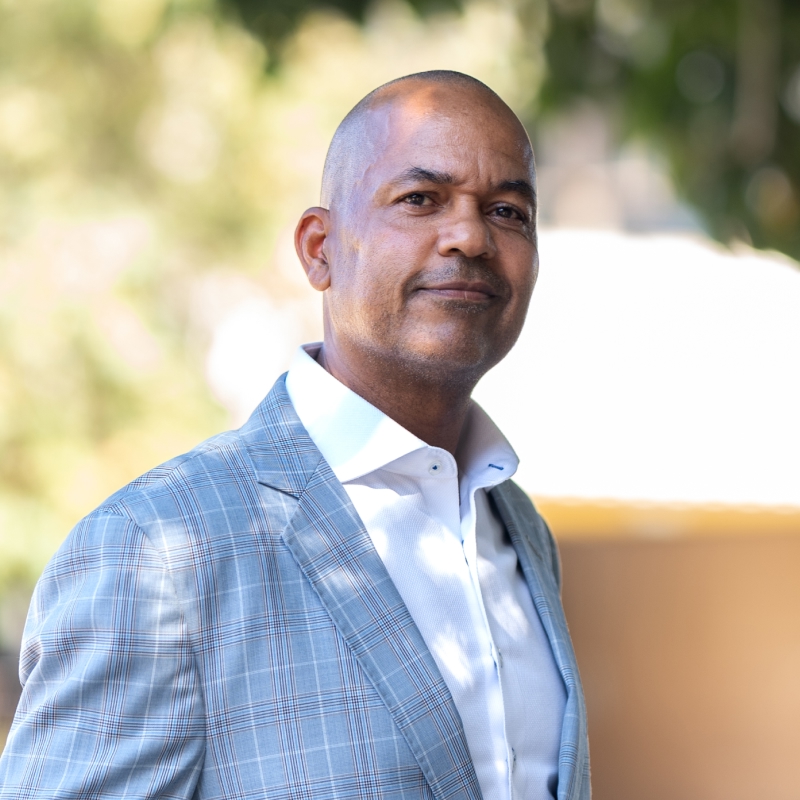Black Thinking and Culture
Department of Black Studies student scholarships made possible by Otieno Okatch ’92
Otieno Okatch ’92 is the president and CEO of PALS, Inc., a behavior management day services provider in Southern and Central Coast California. He serves on the Division of Social Sciences Dean’s Cabinet and has been a longtime supporter of UC Santa Barbara. In honor of his grandmother, who passed in 2021, Otieno has established the Mable Iola Brown Fuller Endowment to support student scholarships in the Department of Black Studies.
As a student, Otieno was on the surfing team and participated in UC Santa Barbara’s Educational Opportunity Program.
“Whether you were a sports star or a nuclear engineer, the chance for all of us from diverse backgrounds to come together was really cool,” said Otieno.
Mable Iola Brown Fuller was born in 1925, in a small town a wagon ride from Muskogee. It was one of the small Black towns that sprung up in Oklahoma after the Civil War. Her family lived in a one-room house and farmed their acre of land. Muskogee was just 52 miles away from the site of the 1921 Tulsa Massacre.
“I saw in her a resolve to keep moving, and I admired that aspect of her character,” said Otieno. Otieno is the biracial son of a Kenyan father and white mother. After his father passed when Otieno was young, Mable entered his life as his stepfather’s mother.
“Having a white mother, grandma Mable was the first Black woman that I knew who taught me how a Black woman moves and thinks and hurts. The experience of having Mable and her son in my life — watching her use the hot comb on my little sister — gave me tremendous benefits. I want to acknowledge those parts of me that are not from me, per se, but are things that I was quite fortunate to receive. That’s what the endowment is to me: honoring the people who came before me,” said Otieno.
When Otieno thinks about giving back, he remembers a lecture from one of his very first professors at UC Santa Barbara. Professor Applebaum asked the class how an individual could maximize their chances for success. The answer? By choosing one’s parents. Otieno is grateful for positive influences in his life: his parents, who ran a model group home from their house, and his indomitable grandmother, who still worked at a Montessori school at age 92.
“The Department of Black Studies is extremely grateful to Mr. Otieno Okatch for his continued support as a donor as well as his intellectual and social interests in Black studies,” said Ingrid Banks, former department chair. “In supporting the Department of Black Studies through the Mable Iola Brown Fuller Endowment, Mr. Okatch’s commitment recognizes the important work that we do. Given the heightened attention to state-sanctioned violence in policing against Black people in our nation, there is a way in which it is now “trendy” to declare “Black Lives Matter” or pay attention to centuries-long oppression against people of African descent.
“As a professor of Black studies, I welcome attention that will assist in dismantling systemic anti-Blackness in all facets of our society, but in Black studies, we have been making that declaration for centuries. Mr. Okatch has continuously supported Black studies, and therefore Black lives, well before the tragic deaths of Ahmaud Arbery, Breonna Taylor, George Floyd, and many others. It illustrates his ongoing commitment to giving back and assisting the Department of Black Studies in doing the important work that we do, especially in teaching and mentoring students.”
Otieno wants to support not just individual students but also the ideas and imperatives that emanate from Black thinking and Black culture. “The end goal is to have people knowing more, feeling more in terms of the possibilities of who we can be. Through that exposure, students will be better contributors to society,” said Otieno.
“Through this endowment and other people’s work, I’m hoping that we can expand people’s consciousness and get some better decision-making for our world.”
Published October 2022
Having a white mother, Grandma Mable was the first Black woman that I knew who taught me how a Black woman moves and thinks and hurts... I want to acknowledge those parts of me that are not from me, per se, but are things that I was quite fortunate to receive.
Otieno Okatch '92
